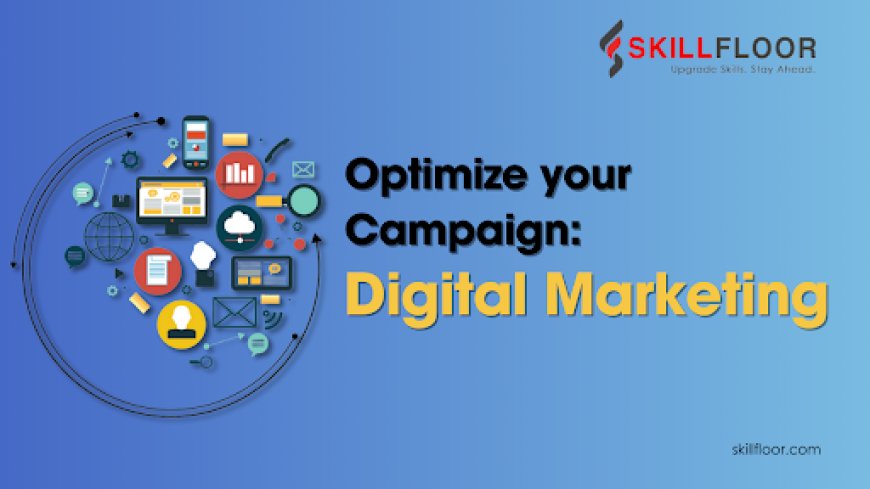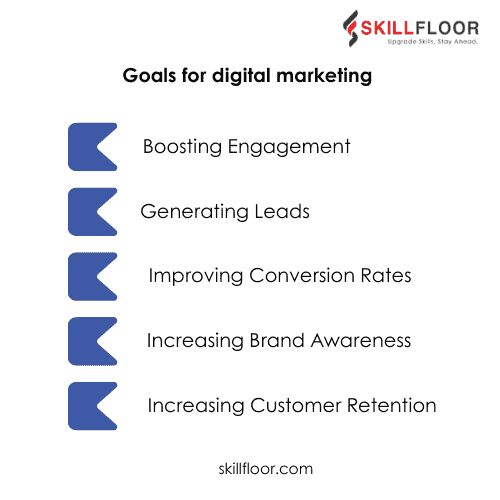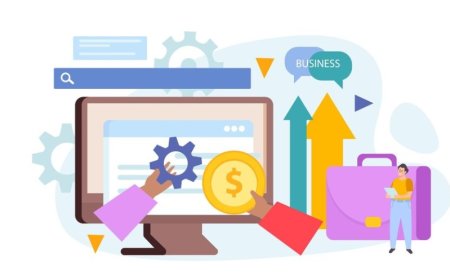Strategies to Optimize Your Campaign in Digital Marketing
the potential of your digital marketing campaigns with effective optimization strategies. Elevate your brand's online presence and drive results.

Like a hidden ingredient, optimization is what makes digital marketing initiatives truly effective. By focusing on strategies to optimize your campaign in digital marketing, you can enhance your reach, engagement, and ROI in digital campaigns. The key is to examine the data closely, identify areas for improvement, and make necessary adjustments to get the best outcomes. For example, optimizing your email marketing campaign may involve adding flair to your subject lines, customizing content, and determining the ideal moment to send to increase open and click-through rates. Employing digital marketing strategies that focus on optimization helps you stay ahead of the competition and respond to your audience's needs. Additionally, using SEO (search engine optimization) techniques and PPC (pay-per-click) advertising can further boost your campaign's effectiveness. By employing strategies to optimize your campaign in digital marketing, you ensure your efforts are impactful and meaningfully engage your target audience, strengthening and personalizing client relationships while expanding your business.
Setting Clear Objectives
Any digital marketing effort needs to have specific, quantifiable goals. Setting and achieving specific goals helps you concentrate on the things that count. They also let you monitor your development and change as necessary to get better outcomes. For example, a measurable goal would be to "increase website traffic by 20% over the next three months," rather than just "increase website traffic." This precise goal makes it simpler to evaluate your progress and provides you with a clear target to work toward.
Typical goals for digital marketing include:

Increasing Website Traffic: Increasing website traffic and attracting more visitors to your site.
Boosting Engagement: Encouraging more likes, shares, and comments on social media.
Generating Leads: Capturing contact information from potential customers.
Improving Conversion Rates: Turning more visitors into paying customers.
Increasing Brand Awareness: Increasing your brand's awareness among the public.
Increasing Customer Retention: Maintaining the interest and loyalty of current clients.
Understanding Your Audience
Any campaign's success depends on your ability to understand the people you want to reach. Through audience analysis, you may better target messages to their interests and requirements, increasing the effectiveness of your campaign. It's easier to select the appropriate channels and produce content that resonates when you know your target. For example, you can create messages that boost response rates and engagement by getting to know their interests and behaviors. By identifying distinct categories and customizing your approach for each, audience analysis also enables you to increase the targeting of your campaign. In summary, understanding your audience enables you to establish deeper connections and accomplish your marketing objectives.
Tools and techniques for audience segmentation and analysis.
|
Tool/Technique |
Description |
|
Google Analytics |
Tracks and analyzes website traffic, user behavior, and demographics. |
|
Social Media Insights |
Provides data on audience demographics, interests, and engagement on social platforms. |
|
Surveys and Questionnaires |
Gathers direct feedback from your audience about preferences and behaviors. |
|
Customer Relationship Management (CRM) |
Stores and analyzes customer data, purchase history, and interactions. |
|
Segmentation Software |
Tools like HubSpot, Marketo, and Segment automate audience segmentation. |
|
Platforms like Mailchimp and Constant Contact offer segmentation based on email engagement. |
Choosing the Right Platforms
Many places are available for you to reach your audience with digital marketing. You can establish connections with users on social networking sites like Facebook, Instagram, and Twitter by posting interesting content and having meaningful interactions. Personalized messages and promotions can be sent directly to your audience's inbox using email marketing, allowing for direct communication. With the use of tailored advertisements and search engine optimization (SEO) techniques, search engines such as Google offer chances to connect with people who are actively looking for products or information relevant to your company. Every platform has advantages and can be useful based on your objectives and intended audience. A thorough digital marketing plan that optimizes your reach and interaction may be developed by comprehending the special qualities and benefits of each platform.
Creating Compelling Content
When it comes to digital marketing, content is essential for keeping users' attention and increasing conversions. It's what draws people in, informs them, entertains them, and motivates them to act. Different content types achieve different goals and have unique effects on interaction and conversion rates. Videos work well for storytelling and product or service showcasing since they are aesthetically pleasing and have a rapid rate of conveying complex information. In addition to establishing authority and offering useful information, blogs may improve their search engine rankings through SEO. Infographics make complex data easier to understand and share by presenting it in an appealing and accessible way. Every kind of content has advantages and may be carefully employed to captivate viewers and lead them through the conversion process.
Utilizing SEO Best Practices
The practice of improving your website and content to appear higher on search engine results pages is known as SEO, or search engine optimization (SERPs). It's similar to increasing the visibility of your online presence to people looking for information about your company or sector. By putting SEO tactics into practice, you raise the likelihood that your website will rank well in search results, boosting visibility and drawing in more natural traffic.
Key SEO strategies for digital campaigns include:
-
Keyword Research: Identifying the terms and phrases consumers use to search for products or services linked to your organization is known as keyword research.
-
On-Page Optimization: Ensure that your website's pages are properly structured and contain pertinent keywords by practicing on-page optimization.
-
Good Content: Produce informative and engaging material that readers will want to read and share.
-
Link Building: Getting other websites to link to yours is known as link building, and it tells search engines that your website is reliable.
-
Mobile Optimization: Ensuring that your website functions and looks good on mobile devices, or tablets, is known as mobile optimization.
-
User Experience (UX): Designing a website that is simple to use and navigate to ensure a positive experience for users.
A/B Testing
It's similar to testing with different ingredients in a recipe to improve it as you test various campaign parts. It enables you to determine what functions well and poorly. You can enhance your campaign by testing various elements like website layouts, ad styles, and email subject lines to gain a deeper understanding of your audience. By testing, you can make adjustments to get better outcomes, such as an increase in clicks or revenue. It's important to make your campaign as effective as possible, so don't be afraid to try different things and see what suits your audience the best.
We've covered several great strategies to raise the efficacy of your campaign. From testing with different campaign components to employing different kinds of material like blogs, infographics, and videos to better understand your audience, SEO optimization is important. These techniques can improve your campaign's performance and help you engage your audience more successfully. I urge you to put these strategies into practice. You can expect higher levels of engagement and success if you use what you've learned and make adjustments in light of your findings. Try them out and see how they can help your marketing!






























































